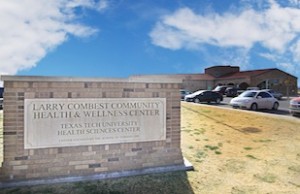TTUHSC School of Nursing Treats Heart Disease Interprofessionally

A new effort by the Texas Tech University Health Sciences Center (TTUHSC) School of Nursing is following TTUHSC’s tradition of emphasizing the importance of interprofessional teamwork to improve patient outcomes. The project titled, “Interprofessional Collaborative Practice in a Nurse Managed Health Center” seeks to use interprofessional teamwork to effectively reduce the instance of cardiovascular disease in patients with other chronic conditions such as diabetes and hypertension.
Working out of the Larry Combest Community Health and Wellness Center, the Interprofessional Collaborative Practice in a Nurse Managed Health Center project team recently began seeing the first patients with the program. With a new grant awarded by the Health Resources and Services Administration (HRSA), the Interprofessional Collaborative Practice in a Nurse Managed Health Center project will work to substantially benefit underserved populations.
“Our primary focus of this project is to investigate the effects of an intervention that is really based on interprofessional, collaborative practice,” said Christina Esperat, Ph.D., R.N., FAAN, associate dean for clinical services and community engagement and Interprofessional Collaborative Practice in a Nurse Managed Health Center project director. “Specifically, the intervention is geared toward cardiac risk reduction in patients with chronic disease.”
There is a common concurrence of certain diseases, like diabetes, with cardiovascular disease. In fact, cardiovascular disease and stroke account for approximately 65 percent of deaths in type 2 diabetics, an outcome that providers like Esperat are trying to help patients at the Combest Center avoid.
“A big portion of our population has chronic diseases like diabetes, hypertension or both, with other co-morbidities such as chronic obstructive pulmonary disease (COPD), asthma and cardiovascular disease like congestive heart failure,” Esperat explained. “Our primary goal is to prevent further cardiovascular complications in these patients. For those who are pre-diabetic and at risk for developing diabetes, we want to prevent them from developing diabetes and subsequent cardiovascular disease.”
The Interprofessional Collaborative Practice in a Nurse Managed Health Center project will investigate whether patient outcomes can be significantly improved when care providers are working together with an interprofessional emphasis.
“We have primary care providers, primarily nurse practitioners, along with a dietician, social worker and pharmacists,” Esperat said. “This interprofessional team will work together to deliver services to the chronic disease population.”
Esperat also explained that the care delivered will be a direct intervention for patients who are at an elevated risk for heart disease due to other chronic diseases. In these high-risk groups, the all-hands-on-deck method may provide the support patients need to avoid heart disease. Esperat’s core team has expanded the range of services available to the patient, so that he or she may have access to every possible success factor.
“Their intervention service is really bolstered by community health workers,” Esperat explained. “We call this an enabling service, or support service, provided by a community health worker who are certified to provide social support, resources, referrals and educational programs to help the patient through a home visitation program.”
The core team working with Interprofessional Collaborative Practice in a Nurse Managed
Health Center +
has found that implementing an interprofessional team can be challenging.
“An obstacle we face is the ‘novelty’ of this kind of interprofessional approach,” Esperat explained. “Most of our providers have not been trained toward this kind of interprofessionalism. Our model of health care utilizes silo practice, meaning everyone practices independently. It takes a lot of training and interaction to implement truly team-based care.”
Esperat says that since a number of training programs are now available to promote interprofessionalism in a group like the Interprofessional Collaborative Practice in a Nurse Managed Health Center team, providers are now able to practice more collaboratively. In fact, Interprofessional Collaborative Practice in a Nurse Managed Health Center team participated in a number of these programs before treated patients.
“We have training curriculums now to expose our core team to interprofessionalism,” Esperat said. “We exposed the team to the Bale/Doneen heart attack and stroke prevention method, which is an aggressive approach to prevent cardiovascular disease among chronic disease patients. We also trained the team on the Tranformation for Health conceptual framework, which is a philosophical approach we developed here that TTUHSC School of Nursing. The framework explains that for patients to meet goals, they have to do certain things. Together with the TeamSTEPPS training, we’ve really created a unified interprofessional approach.”
Related Stories
Celebrating Veterans: TTUHSC’s General Martin Clay’s Legacy of Service and Leadership
From his initial enlistment in the Army National Guard 36 years ago to his leadership in military and civilian health care management roles, Major General Martin Clay’s career has been shaped by adaptability, mission focus and service to others.
Texas Tech University Health Sciences Center School of Nursing Named Best Accelerated Bachelor of Science in Nursing Program in Texas
The TTUHSC School of Nursing Accelerated Bachelor of Science in Nursing (BSN) program has been ranked the No. 1 accelerated nursing program in Texas by RegisteredNursing.org.
TTUHSC Names New Regional Dean for the School of Nursing
Louise Rice, DNP, RN, has been named regional dean of the TTUHSC School of Nursing on the Amarillo campus.
Recent Stories
National Academy of Inventors Names TTUHSC Faculty Senior Members
The National Academy of Inventors (NAI) has designated two current and one former TTUHSC faculty researchers as Senior Members.
The John Wayne Cancer Foundation Surgical Oncology Fellowship Program at Texas Tech University Health Sciences Center Announced
TTUHSC is collaborating with the John Wayne Cancer Foundation and has established the Big Cure Endowment, which supports the university’s efforts to reduce cancer incidence and increase survivability of people in rural and underserved areas.
TTUHSC Receives $1 Million Gift from Amarillo National Bank to Expand and Enhance Pediatric Care in the Panhandle
TTUHSC School of Medicine leaders accepted a $1 million philanthropic gift from Amarillo National Bank on Tuesday (Feb. 10), marking a transformational investment in pediatric care for the Texas Panhandle.
